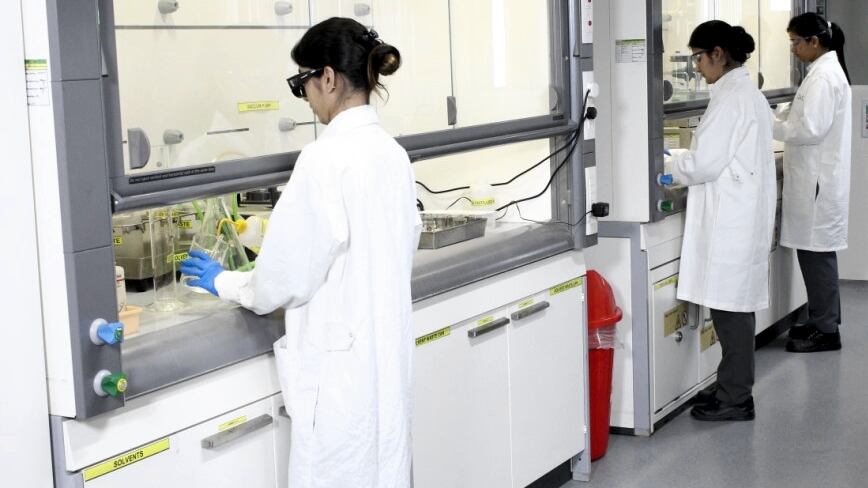Members of an international research team found that fortified, lipid- or fat-based nutritional supplements provided to women in Bangladesh was more effective in promoting healthy birth outcomes for infants than just iron and folic acid prenatal supplements, which are commonly recommended for pregnant women.
The study tracked the health of more than 3,000 women and their infants in the country, where malnutrition among expectant mothers is considered one of the main factors contributing to stunting and poor health among newborns. In Bangladesh, 37% of infants have a low birth weight, and around 20% of babies are born stunted.
“Maternal malnutrition is one of several factors that contribute to poor birth outcomes, and the degree of undernutrition, including micronutrient deficiency, among women in rural Bangladesh is particularly alarming,” said UC Davis nutrition professor Kathryn Dewey, principal investigator for the study.
Since 2008, Dewey has been coordinating a substantial research effort to investigate lipid-based nutrition. The project focuses on formulating and evaluating cost-effective, lipid-based supplements that have shown promise for improving nutrition for children and women in impoverished nations.
These supplements—typically in quantities of around four teaspoons per day—can be used to enrich common, household foods.
In this latest study, Dewey’s team conducted a randomised intervention within a community health program in rural northwest Bangladesh which enrolled pregnant women who were less than 20 weeks into their pregnancies.
The goal was to evaluate the lipid-based supplement in preventing maternal and child undernutrition when it was provided to the women during pregnancy and the first six months postpartum.
A similar supplement was provided to the babies aged 6-24 months, during the critically important period when foods in addition to breast milk are added to the diet.
Provision of the lipid-based supplement to pregnant women significantly increased birth weight, birth length and head size.
There was a 25% reduction in newborn stunting among women who reported regularly consuming the lipid-based supplement, compared to the women who reported regularly consuming the iron and folic-acid supplement.
“It is not well understood exactly how much stunting occurs before a child is born compared to that which occurs after birth,” said the study’s first author, Malay Mridha.
“However it is generally agreed that early stunting has adverse lifelong consequences. Thus, preventing newborn stunting is an important part of assuring adequate child growth and development.”
Mridha added that the results of this study, along with those of other recent studies using lipid-based nutrient supplements, may lead to new global recommendations regarding interventions that are effective for reducing maternal and infant undernutrition.
More stories from south Asia…
FSSAI could waive approval requirement for pre-cleared ingredients
India’s food regulator may end the practice of requiring manufacturers to gain approvals for products that have been deemed safe elsewhere, according to media reports.

The current approval process, which was introduced in May 2013 through an advisory by the Food Safety and Standards Authority of India, requires all ingredients to be approved.
However, this process has been been criticised by a barrage of ministers and food processors, while the Supreme Court ruled last year that it had no official standing and should not be construed as a regulation.
The FSSAI subsequently discontinued its approvals process, but then announced that it would consider enacting it as a regulation, which led to widespread concern among food companies.
However, now it seems that the regulator is leaning towards introducing regulations that are practiced across a number of developed overseas food markets.
Speaking to Economic Times, an unnamed senior FSSAI officer said: "We are in the process of formulating regulations for product approval process. We thought we could take this opportunity to review the procedure rather than just convert the advisory into regulation.”
Food ministry weighs up changes to ‘Best before’ labelling
“Best before” could be replaced with “Expiry date” on food labels as the traditional marking has no relevant meaning, India’s food and consumer affairs minister has said.

"We want that only there is 'expiry date'. There is no meaning in 'best before’,” Ram Vilas Paswan told the PTI news service, adding that he had instructed his department to develop a policy to implement a new system.
Pasawan’s comments follow remarks by the National Consumer Disputes Redressal Commission president last week, who warned that current food labelling practices could confuse consumers.
Fearing that “Best before” dates did not indicate how long a food product would be fit for human consumption, DK Jain called on India’s food regulator to look into the nature of date labelling.
